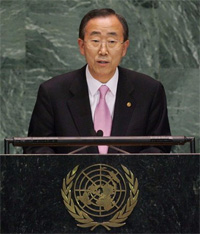Oct 12, 2007
 Last evening I attended a reception and dinner in Washington for evangelical Christian leaders, which is not an unusual event here. But the topic and, especially, the main speaker would seem highly unusual to many. The event, called "A Global Leaders Forum," was hosted by the National Association of Evangelicals and the Micah Challenge, a global advocacy campaign focused on achieving the Millennium [...]
Last evening I attended a reception and dinner in Washington for evangelical Christian leaders, which is not an unusual event here. But the topic and, especially, the main speaker would seem highly unusual to many. The event, called "A Global Leaders Forum," was hosted by the National Association of Evangelicals and the Micah Challenge, a global advocacy campaign focused on achieving the Millennium [...]
Read the Full Article

Already a subscriber? Login